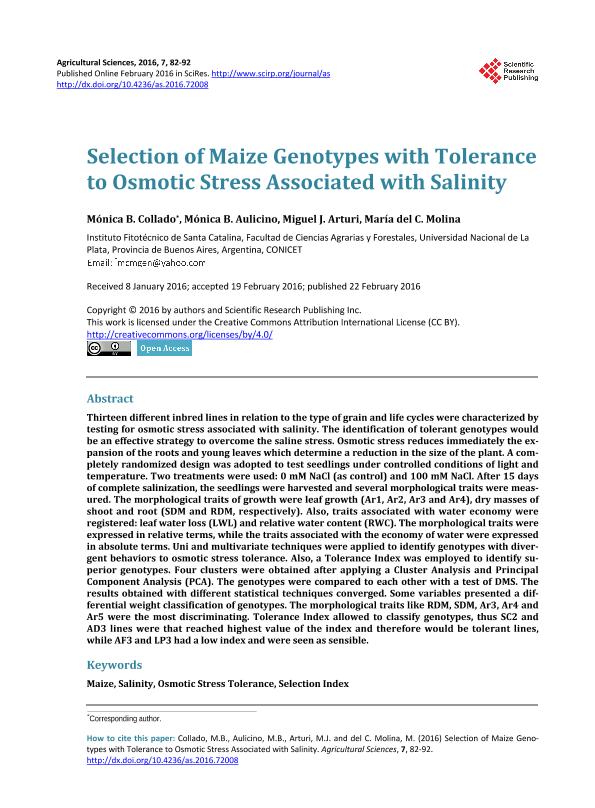Mostrar el registro sencillo del ítem
dc.contributor.author
Collado, Mónica B.
dc.contributor.author
Aulicino, Mónica Beatriz

dc.contributor.author
Arturi, Miguel Jacinto

dc.contributor.author
Molina, María del Carmen

dc.date.available
2020-08-31T15:06:58Z
dc.date.issued
2016-02
dc.identifier.citation
Collado, Mónica B.; Aulicino, Mónica Beatriz; Arturi, Miguel Jacinto; Molina, María del Carmen; Selection of Maize Genotypes with Tolerance to Osmotic Stress Associated with Salinity; Scientific Research Publishing Inc; Agricultural Sciences; 07; 02; 2-2016; 82-92
dc.identifier.issn
2156-8561
dc.identifier.uri
http://hdl.handle.net/11336/112756
dc.description.abstract
Thirteen different inbred lines in relation to the type of grain and life cycles were characterized by testing for osmotic stress associated with salinity. The identification of tolerant genotypes would be an effective strategy to overcome the saline stress. Osmotic stress reduces immediately the expansion of the roots and young leaves which determine a reduction in the size of the plant. A completely randomized design was adopted to test seedlings under controlled conditions of light and temperature. Two treatments were used: 0 mM NaCl (as control) and 100 mM NaCl. After 15 days of complete salinization, the seedlings were harvested and several morphological traits were measured.The morphological traits of growth were leaf growth (Ar1, Ar2, Ar3 and Ar4), dry masses of shoot and root (SDM and RDM, respectively). Also, traits associated with water economy were registered: leaf water loss (LWL) and relative water content (RWC). The morphological traits were expressed in relative terms, while the traits associated with the economy of water were expressed in absolute terms. Uni and multivariate techniques were applied to identify genotypes with divergent behaviors to osmotic stress tolerance. Also, a Tolerance Index was employed to identify superior genotypes. Four clusters were obtained after applying a Cluster Analysis and PrincipalComponent Analysis (PCA). The genotypes were compared to each other with a test of DMS. The results obtained with different statistical techniques converged. Some variables presented a differential weight classification of genotypes. The morphological traits like RDM, SDM, Ar3, Ar4 and Ar5 were the most discriminating. Tolerance Index allowed to classify genotypes, thus SC2 andAD3 lines were that reached highest value of the index and therefore would be tolerant lines,while AF3 and LP3 had a low index and were seen as sensible.
dc.format
application/pdf
dc.language.iso
eng
dc.publisher
Scientific Research Publishing Inc
dc.rights
info:eu-repo/semantics/openAccess
dc.rights.uri
https://creativecommons.org/licenses/by/2.5/ar/
dc.subject
ZEA
dc.subject
SALINITY
dc.subject
OSMOTIC STRESS TOLERANCE
dc.subject
SELECTION INDEX
dc.subject.classification
Biotecnología Agrícola y Biotecnología Alimentaria

dc.subject.classification
Biotecnología Agropecuaria

dc.subject.classification
CIENCIAS AGRÍCOLAS

dc.title
Selection of Maize Genotypes with Tolerance to Osmotic Stress Associated with Salinity
dc.type
info:eu-repo/semantics/article
dc.type
info:ar-repo/semantics/artículo
dc.type
info:eu-repo/semantics/publishedVersion
dc.date.updated
2020-08-19T20:20:28Z
dc.journal.volume
07
dc.journal.number
02
dc.journal.pagination
82-92
dc.journal.pais
Italia

dc.description.fil
Fil: Collado, Mónica B.. Universidad Nacional de La Plata. Facultad de Ciencias Agrarias y Forestales. Instituto Fitotécnico de "Santa Catalina"; Argentina
dc.description.fil
Fil: Aulicino, Mónica Beatriz. Universidad Nacional de La Plata. Facultad de Ciencias Agrarias y Forestales. Instituto Fitotécnico de "Santa Catalina"; Argentina. Consejo Nacional de Investigaciones Científicas y Técnicas. Centro Científico Tecnológico Conicet - La Plata; Argentina
dc.description.fil
Fil: Arturi, Miguel Jacinto. Universidad Nacional de La Plata. Facultad de Ciencias Agrarias y Forestales. Instituto Fitotécnico de "Santa Catalina"; Argentina
dc.description.fil
Fil: Molina, María del Carmen. Universidad Nacional de La Plata. Facultad de Ciencias Agrarias y Forestales. Instituto Fitotécnico de "Santa Catalina"; Argentina. Consejo Nacional de Investigaciones Científicas y Técnicas. Centro Científico Tecnológico Conicet - La Plata; Argentina
dc.journal.title
Agricultural Sciences
dc.relation.alternativeid
info:eu-repo/semantics/altIdentifier/url/https://www.scirp.org/journal/paperinformation.aspx?paperid=63598
dc.relation.alternativeid
info:eu-repo/semantics/altIdentifier/doi/http://dx.doi.org/10.4236/as.2016.72008
Archivos asociados
